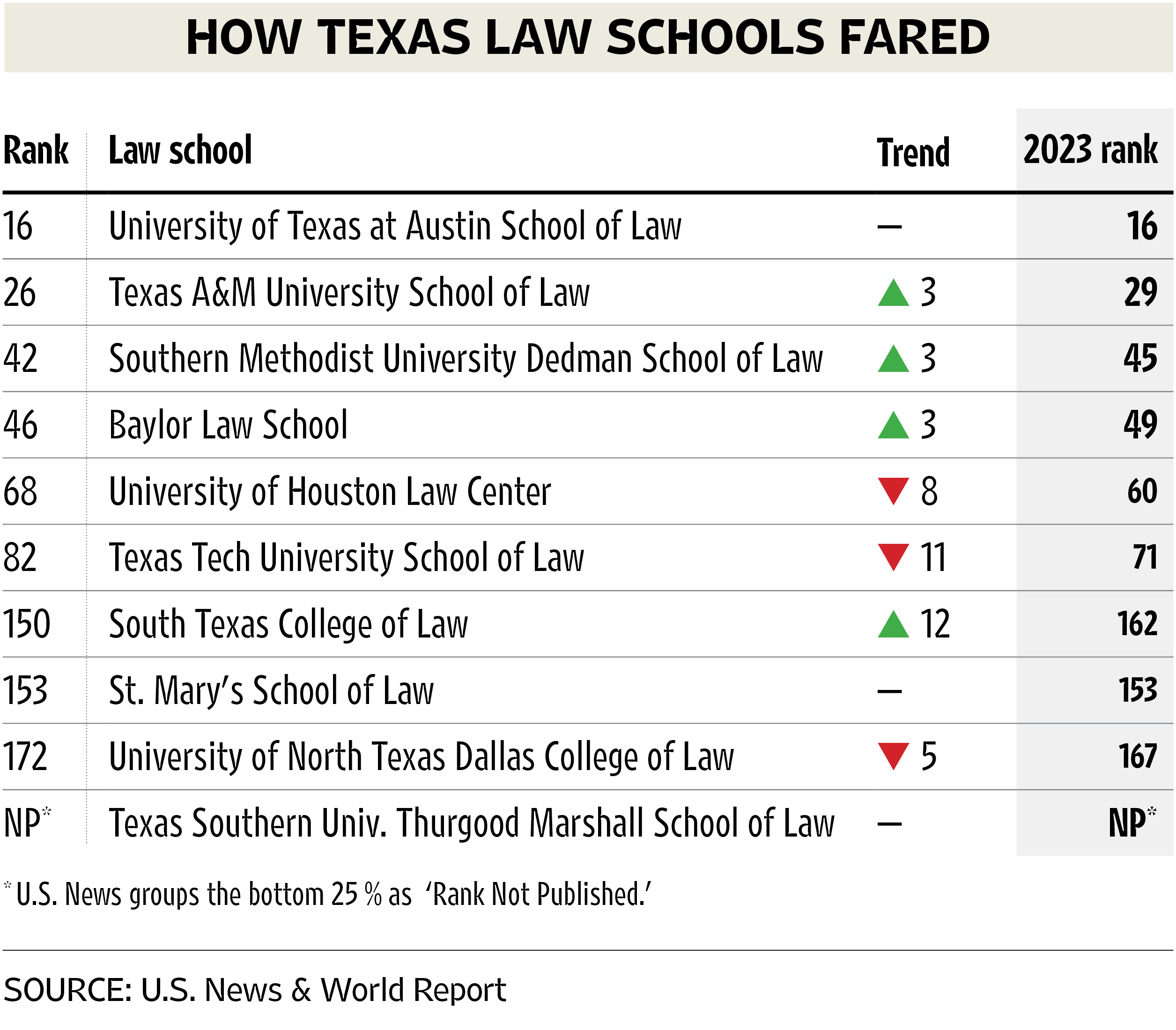The Texas A&M University School of Law in Fort Worth continued its ascent through the rankings of American law schools as reported by U.S. News & World Report, rising to No. 26 in the magazine’s much-maligned yet closely followed annual list of the country’s best law schools.

Last year, A&M was ranked No. 29 in the country by U.S. News. At 26, it is second only to the state’s flagship law school, that of the University of Texas at Austin, which was deemed to be the 16th best in the country, tied with the University of Minnesota Law School and the law school at Washington University in St. Louis. UT Law saw no movement, as it came in at No. 16 last year, too.
A&M officials, while acknowledging some of the reservations expressed by others around the country about the much-ballyhooed annual U.S. News list, nonetheless expressed pride in the 11-year-old Texas A&M School of Law’s meteoric rise in the rankings. The A&M System bought the Fort Worth school in 2013 from Texas Wesleyan University.
In the past five years, the A&M school has risen from No. 83 in the country to No. 26, according to U.S. News.
“I was thrilled, but not surprised, to learn about the latest rankings,” Mark A. Welsh III, Texas A&M’s president, said in a written statement. “Rising 57 spots in five years is an incredible feat. The law school’s continued upward trajectory is a direct result of the exceptional work of our world-class faculty and staff who are passionate about their role in educating the best Aggie lawyers possible.”
Robert B. Ahdieh, dean of the law school, said: “Rankings can sometimes be noisy — reflecting quirks of the moment as much as anything else. When you consider Texas A&M Law’s steady progress over time, however, it can be understood to reflect the underlying achievements we have made — as well as the passion and commitment of our stellar faculty, student body and staff. That is undoubtedly something to celebrate.”

Law school deans and other academicians have long complained that the U.S. News rankings value students who test well and, upon graduation, land high-paying jobs with silk-stocking firms over other metrics — such as dual degrees that may take longer to earn, and internships and fellowships after graduation.
Nonetheless, many concede, doing well in the rankings helps law schools raise money and recruit top students and faculty.
But not the UH Law Center. When asked whether UH sees a substantive difference in recruiting and applications based on the U.S. News rankings, Assistant Dean of Communications and Marketing Carrie A. Criado wrote: “We have not seen any changes in our applications. We have the third largest number of applications of all ten Texas law schools.”
UH Law Center Dean Leonard M. Baynes published a note addressing the rankings and the 2023 changes to its methodology.
“At times, this process feels like a student who is taking an exam with assigned points for different sections, but after the exam, the professor informs the students that they had significantly changed the grading metric on the test without any advance warning,” Baynes wrote.
In late 2022, Yale University and Harvard University announced that they would no longer voluntarily take part in U.S. News’ rankings of law schools and other academic programs. Other schools soon followed their lead. For this year’s rankings, more than half of the U.S. law schools ranked in the Top 25 by U.S. News declined to complete voluntary surveys from the magazines.
U.S. News officials said that after meeting with top administrators from more than 100 law schools, it would modify its ranking methodology to better reflect the outcomes of graduation from schools, rather than focusing as much on the academic achievements of students entering and matriculating in the schools.
The magazine continues to rank even those schools that choose not to participate in its surveys, relying on information about the schools that’s available through the ABA and other sources.
Baynes said the publication’s changes “undoubtedly” impacted the 2024 rankings, and he anticipates UH Law Center’s overall ranking will improve in the 2025 report.
“Our work in improving our rankings is far from finished, and we will strive to make the Law Center’s rankings a more accurate reflection of our world-class standing,” Baynes wrote.
Baynes pointed out the Report had high rankings for several of UH Law Center’s specialty programs. The Law Center’s health law program ranked No. 7 while the intellectual property and part-time programs ranked No. 8. A total of nine specialty programs including trial advocacy, environmental law and tax law programs were named in the Top 50 specialty programs, Baynes noted.
“What remains constant is that the University of Houston Law Center remains a premier institution, and it helps to place its graduates in jobs with a high earning potential as they begin their legal careers,” Baynes wrote.
